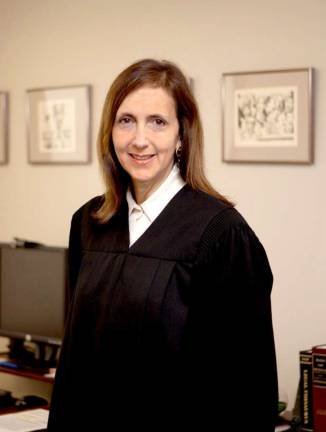Judge Barbara Jaffe Has an Eye Towards Compassion and Entrepreneurship

by Megan Bungeroth Judge Barbara Jaffe didn't always envision herself in black robes sitting on the bench. She began her career as an administrator for a wholesale arts and antiques company for almost eight years. But even though she found her true passion in the law, she still cutes her business background and arts expertise as unique qualities that would be a great boon to a Surrogate's Court judge. "I sat in the auctions, I bought and sold goods, I took care of the paperwork, I paid the bills, I invoiced the customers, I paid the employees," she said of her time in the arts world. "I didn't really like it, so I went to law school and I never looked back, but I know how to manage. Those management skills and entrepreneurial skills that I obtained in the business will help me in look at the issues in the Surrogate's court. She also has seen her fair share of art appraisals and knows her way around an expensive painting, something that could come in handy for a court that is often tasked with placing a value on pricey collections. Jaffe has been a judge for the past 10 years, after serving as an attorney and law clerk, and she's currently on the state Supreme Court hearing matrimonial cases. She often hears extremely emotional cases, dealing with divorce, division of assets and child custody, experience that she hopes will translate well to dealing with surrogate cases where ther is often the fraught element of a deceased family member to contend with in addition to legal issues. "It's a terrible thing to divorce; it's a terrible thing to lose a loved one, and so being in court is not optimal emotionally," said Jaffe. "In Surrogate's Court, you have siblings, cousins, whatever, who fight, and it really does break my heart. I really want to see to it that those cases are resolved as quickly as possible so that people can put these problems behind them." Compassion and openness are important elements of what makes the Surrogate's Court successful, Jaffe said. "It's got to be made comfortable for everybody, including nontraditional families who have not always received a welcome embrace. You never stop educating staff about sensitivity to all kinds of people--from nontraditional families, from non-English-speaking communities," she said. "Surrogate's Court is now more than ever dealing with self-represented litigants who don't know about the system, and it's a fairly complex procedure in the Surrogate's Court." Jaffe produced a legal handbook for the criminal court that has been translated into Spanish, Chinese, Korean, Russian and French and distributed around the state, and she plans to do the same for Surrogate's Court. Jaffe also prides herself on being highly productive. "Motions don't languish me," she said. "I have decided thousands of motions in serious civil matters, in hotly contested civil cases involving a lot of money, and I've been reversed only once. That bears out that I'm not only swift, but I am careful." While she hasn't worked in teh Surrogate's Court, Jaffe said that her experience as a judge in similar situations--dealing with emotionally charged cases or high-value assets--gives her the right qualifications. "I already have judicial experience taking care of these matters. Not just expericenc as an attorney or a court employee, but real judicial experience, which I don't think you can substitute anything for," Jaffe said. Jaffe is currently the co-chair of the Committee on Professional Ethics and Discipline for the New York Women's Bar Association. She also serves on the Committee on the Supreme Court, the Pro Bono Committee and the Committee on LGBT Issues for the New York County Lawyers' Association.